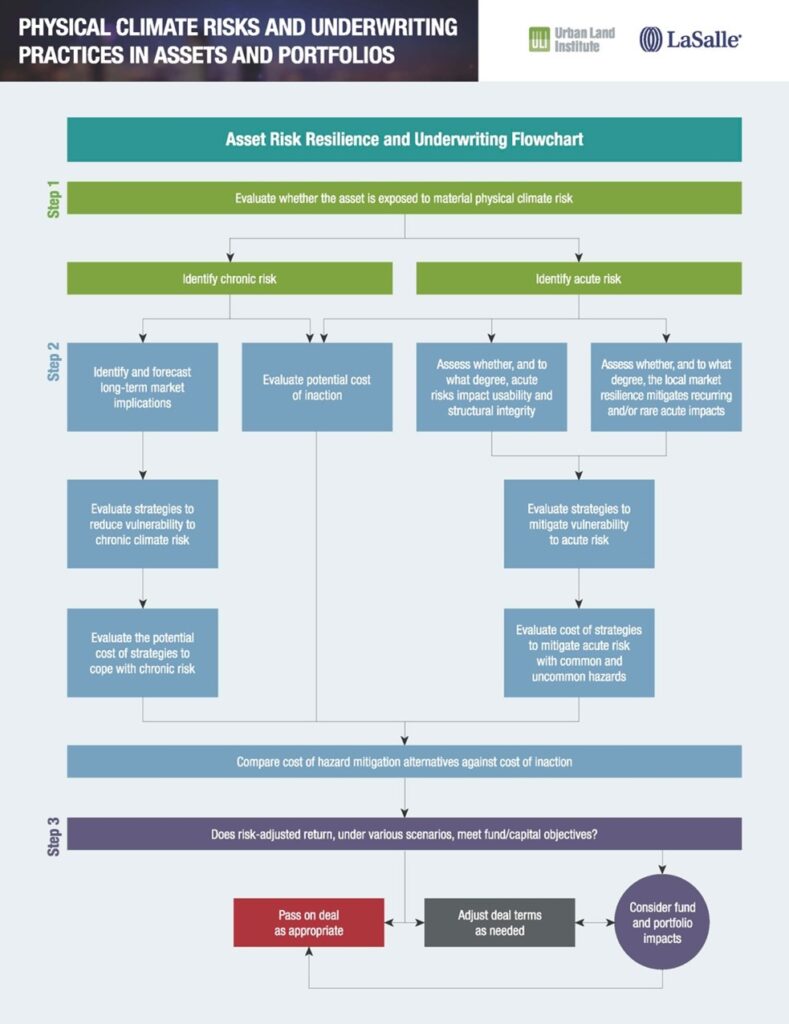-
- Step-by-step framework to evaluate physical and financial risk and compare cost and benefits of resilience
- As of Q4 2023, of the US $850 billion of commercial real estate tracked by NPI, $285 billion, or 34% is situated in high and medium-high climate risk zones in the US, according to LaSalle’s Research and Strategy team analysis
Washington / New York (April 11, 2024) – A new global report from the Urban Land Institute (ULI) and LaSalle Investment Management (LaSalle), a leading real estate investment management firm, offers a new framework to help the real estate industry act on climate risk disclosure data. Across the real estate industry, practitioners understand physical climate risk to assets and portfolios poses a financial risk, but there are still many challenges to enacting on the data being collected and disclosed.
This new framework is the latest tool for real estate investors and other practitioners to evaluate the costs of action and inaction when it comes to investing in resilience. The report, Physical Climate Risks and Underwriting Practices in Assets and Portfolios, is the second in a series by ULI and LaSalle. Building on the first report that outlined how to source and interpret reliable climate risk data, the second provides a market overview, adaptable framework, and recommendations based on emerging best practices for incorporating physical climate risk in the underwriting process.
“Physical climate risk data collection and disclosure is the first step the real estate industry can take to further invest in and build resilient infrastructure,” said Lindsay Brugger, head of Urban Resilience at ULI. “Data drives action and doing nothing incurs deeper costs — from higher insurance premiums to asset repair or replacement. Focusing on the underwriting process, the framework offers investment managers a methodology for developing risk-adjusted returns so deals can be adapted in alignment with a firm’s fund or portfolio objectives.”
“Of the $850 billion of commercial real estate tracked by NPI, LaSalle estimates $285 billion, or 34% is situated in high and medium-high climate risk zones in the US,” said Julie Manning, Global Head of Climate and Carbon at LaSalle Investment Management. “This report helps provide guidance that investment managers can follow to factor the climate risk data they have available to them and improve outcomes at the asset and portfolio level. We want to lead the conversation across the industry and collaborating with ULI is a great conduit to amplify the discussion that will ultimately benefit investors of all kinds with more resilient real estate portfolios.”
The framework is broken down into three steps for decision making based on individual asset risks, local market risks, and ongoing risk mitigation efforts:
1. Evaluate the level of exposure to physical climate risk and financial implications;
2. Identify hazard mitigation strategies and estimate associated costs; and
3. Determine risk-adjusted return and whether or not that return meets firm objectivesThe redevelopment will also look to meet future tenant requirements and evolving work trends with high-quality amenities to promote in-person interaction and facilitate a hybrid working, including an auditorium, business centre, bars and restaurants, event spaces and a media broadcast studio.

As climate impacts continue to influence real estate markets around the world, improving understanding of physical climate risk and adjusting pricing to reflect risk are growing imperatives. Firms can better navigate the complexities of physical climate risk and capitalize on emerging opportunities by leveraging this new report’s insights and guidance. Prioritizing knowledge diffusion and empowering informed decision-making processes is key to effectively managing and mitigating incoming climate risks in the evolving real estate industry, whether at a community or individual building scale.
The full report and downloadable framework can be found on ULI’s Knowledge Finder.
REPORTERS AND EDITORS: For more information, please contact:
ULI
LaSalle
Drew McNeill
About the Urban Land Institute
The Urban Land Institute is a non-profit education and research institute supported by its members. Its mission is to shape the future of the built environment for transformative impact in communities worldwide. Established in 1936, the institute has more than 48,000 members worldwide representing all aspects of land use and development disciplines. For more information on ULI, please visit uli.org, or follow us on Twitter, Facebook, LinkedIn, and Instagram.
About LaSalle Investment Management
LaSalle Investment Management is one of the world’s leading real estate investment managers. On a global basis, LaSalle manages over US $89 billion of assets in private and public real estate equity and debt investments as of Q4 2023. LaSalle’s diverse client base includes public and private pension funds, insurance companies, governments, corporations, endowments and private individuals from across the globe. LaSalle sponsors a complete range of investment vehicles including separate accounts, open- and closed-end funds, public securities and entity-level investments. For more information please visit www.lasalle.com, and LinkedIn.
Company news
 Feb 11, 2025 Kunihiko Okumura and Steve Hyung Kim appointed Asia Pacific leaders Keith Fujii to assume the role of Chairman of Asia Pacific, with all changes to be effective July 1, 2025.
Feb 11, 2025 Kunihiko Okumura and Steve Hyung Kim appointed Asia Pacific leaders Keith Fujii to assume the role of Chairman of Asia Pacific, with all changes to be effective July 1, 2025. Jan 30, 2025 LaSalle and Deeley Freed obtain planning permission for Bristol shopping centre redevelopment Located on Gough Street, the asset will benefit from excellent rail, bus and tram links and help address the undersupply of student housing in the market.
Jan 30, 2025 LaSalle and Deeley Freed obtain planning permission for Bristol shopping centre redevelopment Located on Gough Street, the asset will benefit from excellent rail, bus and tram links and help address the undersupply of student housing in the market. Jan 28, 2025 LaSalle provides a £100 million loan for Apollo’s 699-bed Pavilion Court in Wembley Benefitting from one of Europe’s largest regeneration schemes, the fully leased asset will benefit from close proximity to central London, a wide range of food and beverage establishments and several academic institutions.
Jan 28, 2025 LaSalle provides a £100 million loan for Apollo’s 699-bed Pavilion Court in Wembley Benefitting from one of Europe’s largest regeneration schemes, the fully leased asset will benefit from close proximity to central London, a wide range of food and beverage establishments and several academic institutions.No results found








